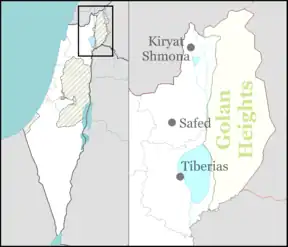Eli-ad | |
|---|---|
 Eli-ad | |
| Coordinates: 32°48′18″N 35°44′3″E / 32.80500°N 35.73417°E | |
| District | Northern |
| Council | Golan Regional Council |
| Region | Golan Heights |
| Affiliation | Moshavim Movement |
| Founded | 1968 |
| Founded by | Nahal |
| Population (2021)[1] | 484 |
Eli-ad (Hebrew: אֵלִי-עַד) is an Israeli settlement organized as a moshav in the southern Golan Heights. It falls under the jurisdiction of Golan Regional Council and in 2021 had a population of 484.[1]
The international community considers Israeli settlements in the Golan Heights illegal under international law, but the Israeli government disputes this.[2]
History
Israel captured the area from Syria in June 1967 in the Six-Day War. In 1968 as a Nahal settlement was founded, and became a moshav two years later. It was originally called El Al (Hebrew: אֶל עָל), "skyward", the same as Israel's national airline El Al (as an alteration of the name of the Arab village of Al ‘Al = "the high place"), and later renamed Eli Al (Hebrew: אֵלִי עַל), before assuming its current name. It is named[3] in memory of the initially successful Israeli spy Eli Cohen, who was captured and hanged in Syria.[4]
Landmarks
Eliad is home to the Château Golan winery.
The nearby stream, Nahal El Al (Hebrew) or Wadi Dafila (Arabic) is a popular hiking destination and contains the Black Waterfall, named for its black basalt rock and situated closer to Avnei Eitan, and the downstream White Waterfall, named for its white limestone rock and located next to Eliad.[5]
See also
References
- 1 2 "Regional Statistics". Israel Central Bureau of Statistics. Retrieved 22 February 2023.
- ↑ "The Geneva Convention". BBC. 10 December 2009.
- ↑ Bitan, Hanna: 1948-1998: Fifty Years of 'Hityashvut': Atlas of Names of Settlements in Israel, Jerusalem 1999, Carta, p.5, ISBN 965-220-423-4 (Hebrew)
Yizhaqi, Arie (ed.): Madrich Israel (Israel Guide: An Encyclopedia for the Study of the Land), Vol 1: Hermon and Golan, Jerusalem 1978, Keter Press, p.257 (Hebrew) - ↑ Carta's Official Guide to Israel and Complete Gazetteer to all Sites in the Holy Land. (3rd edition 1993) Jerusalem, Carta, p.143 , ISBN 965-220-186-3 (English)
- ↑ Tiuli website, "Nahal Elal – Water among Basalt and Chalkstone"